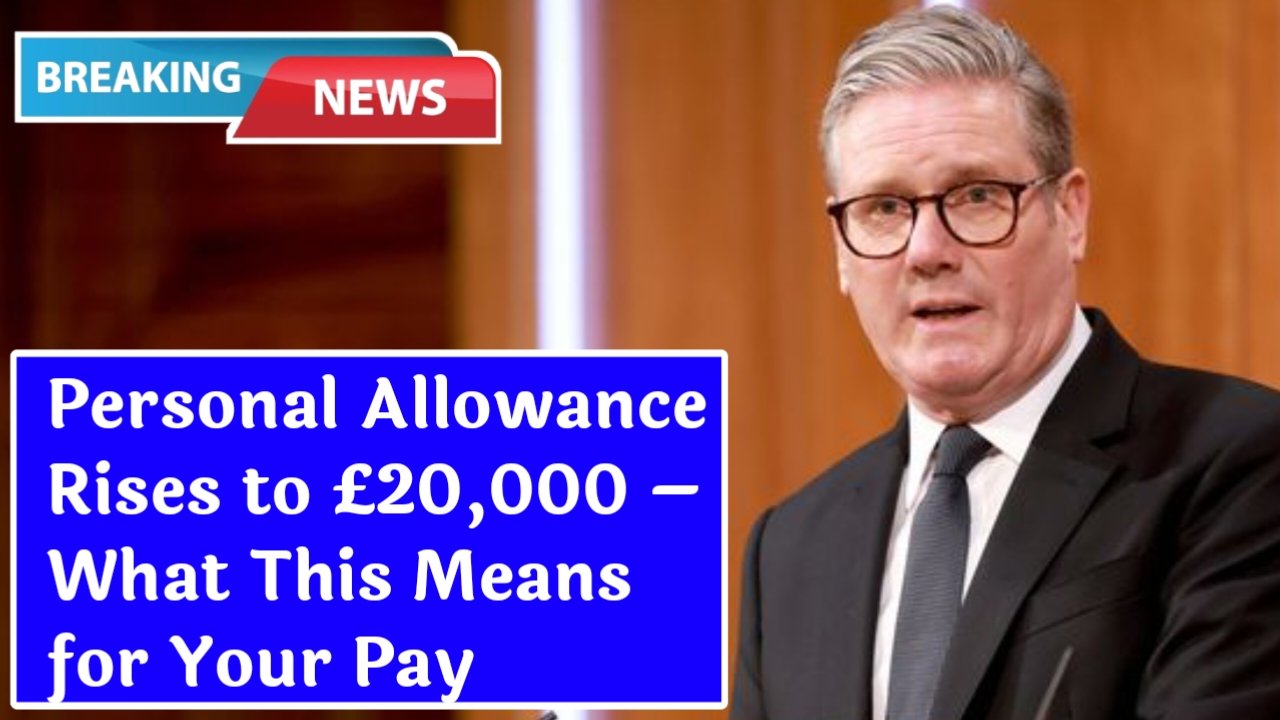The UK Government has confirmed that from April 2025, the Personal Allowance will increase to £20,000, marking one of the most significant changes in recent tax history. For millions of workers across the country, this will mean more take-home pay, reduced tax liability, and a noticeable improvement in household income. But what exactly does this change mean for your salary, your payslip, and the broader UK economy? Let’s break it down in detail.
What is Personal Allowance and Why Does It Matter?
Personal Allowance is the amount of income you can earn before you start paying Income Tax. For years, this allowance has been a key tool in shaping how much money working people keep in their pockets. Up until now, the allowance has stood at £12,570, meaning any income above that threshold was taxable. However, with the rise to £20,000, the average worker will see a dramatic increase in tax-free earnings.

This change is not just a minor adjustment; it’s a policy shift that has the potential to ease the financial burden on families struggling with high living costs. By raising the allowance, the government effectively reduces the number of low and middle-income earners paying income tax, putting more disposable cash back into the economy.
How Much More Will You Take Home with a £20,000 Allowance?
For most employees, the increase in Personal Allowance means a direct financial gain. If you were previously paying tax on income above £12,570, you will now only start paying income tax once you cross the £20,000 mark. This means an additional £7,430 of your income will be completely tax-free.
Let’s put this into perspective. A worker earning £25,000 per year previously paid tax on £12,430 of their salary. Now, they will only pay tax on £5,000. This translates into hundreds of pounds in extra annual savings, depending on your tax band. For those on minimum or average wages, this is effectively like receiving a pay rise without any change from your employer.
Who Benefits the Most from This Change?
The biggest winners from the £20,000 allowance are low to middle-income earners, particularly those earning between £20,000 and £35,000 per year. These individuals will experience the largest relative tax cuts because a larger proportion of their income is now tax-free.
Pensioners with taxable income, part-time workers, and families with secondary earners will also benefit significantly. For many households, especially in areas with high living costs, the additional savings could be used to cover essentials such as rent, groceries, and energy bills. Higher earners will also benefit, but the relative gain compared to their total income will be smaller.
Impact on Take-Home Pay Across Different Income Levels
The rise to £20,000 Personal Allowance reshapes take-home pay across the board. For someone earning £22,000, their taxable income now drops to just £2,000 compared to £9,430 before, resulting in a sharp reduction in their tax bill. For someone on £30,000, the taxable portion is reduced to £10,000, down from £17,430. Even for individuals earning £50,000 or more, while they will continue to pay higher-rate tax after £50,270, they still enjoy the same £7,430 increase in tax-free earnings.
This means every working individual across the UK with an income above £20,000 is keeping more of what they earn, boosting overall financial security and spending power.
Why the Government Raised the Personal Allowance
The decision to raise the allowance comes against the backdrop of rising inflation, cost-of-living pressures, and stagnant wage growth. Households have been struggling with higher energy bills, food prices, and mortgage rates. By lifting the threshold to £20,000, the government is addressing growing demands to provide relief to working families.
It is also a political move, aiming to support economic growth by increasing consumer spending. With more disposable income in the hands of workers, the expectation is that people will spend more on goods and services, stimulating business activity and helping the economy recover from financial strain.
What This Means for Employers and Businesses
Employers may find this change particularly beneficial for staff morale. With employees effectively receiving a tax cut, many will feel financially better off without employers having to raise wages. However, it may also lead to new wage negotiations, as workers reassess their take-home pay in light of reduced tax burdens.
Small businesses, in particular, may see an indirect benefit, as increased consumer spending could translate into higher sales and revenues. On the flip side, critics argue that the change may reduce government tax revenues in the short term, possibly impacting public services unless offset by economic growth.
Possible Concerns and Criticism
While most people welcome the increase in Personal Allowance, there are debates about its long-term impact. Some analysts believe it disproportionately benefits higher earners since everyone gains the same £7,430 in tax-free income. Others worry that it could widen the tax gap, putting additional pressure on government finances.
Another concern is whether the tax savings will be enough to truly offset the cost-of-living crisis. For households facing rent hikes, rising mortgage payments, and childcare costs, the extra few hundred pounds per year may provide relief but not a full solution.
Final Thoughts – A Positive Step for UK Workers
The rise in Personal Allowance to £20,000 is a historic and welcome step for workers across the UK. It gives individuals more control over their finances, reduces the tax burden, and supports families navigating the challenges of a high-cost economy. For the average worker, this change could mean more money for savings, bills, or simply enjoying a better quality of life.
While there are debates about its economic implications, there’s no doubt that millions of households will notice the difference in their payslips from April 2025 onwards. If you’re employed, self-employed, or even receiving pension income, this change ensures you keep more of your hard-earned money.
